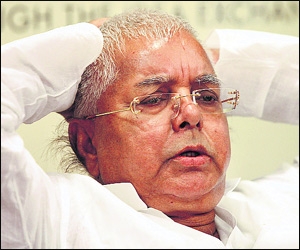 New Delhi, May 2: Parliamentarians across party lines have once again united in the face of criticism and this time it is yoga guru and anti-corruption activist Baba Ramdev who has earned their wrath for calling the members of Parliament corrupt and characterless.
New Delhi, May 2: Parliamentarians across party lines have once again united in the face of criticism and this time it is yoga guru and anti-corruption activist Baba Ramdev who has earned their wrath for calling the members of Parliament corrupt and characterless.
He had said, "There are some politicians who are good. But some others are corrupt and have no character."
Reacting to the comments of Ramdev, Rashtriya Janata Dal (RJD) chief Lalu Prasad Yadav has hit back calling Ramdev mentally sick.
"He is a mental case and frustrated," said the former Union Railways Minister.
It was not just Lalu Prasad who was angered by the statement. The Samajwadi Party, in fact, moved a privilege motion against the yoga guru over the issue.
The party, in its reaction to the comments of the yoga guru, said that his behaviour had never been like a saint.
"Baba Ramdev calls himself a saint but a saint doesn't talk like him. I pray to God to give him a saint like mind," said Samajwadi Party MP Mohan Singh.
Meanwhile, others said they did not need a certificate of approval from the yoga guru.
"We don't need any certificate from Baba Ramdev. We have been selected by the people," said Congress leader Satyavrat Chaturvedi.
Speaking on the issue, senior Bharatiya Janata Party (BJP) MP Yashwant Sinha said that the anti-corruption activist had no right to insult the democracy.
"Being a saint, an NGO or a political leader does not give anyone the power to insult our democracy," said Sinha.





Comments
Add new comment